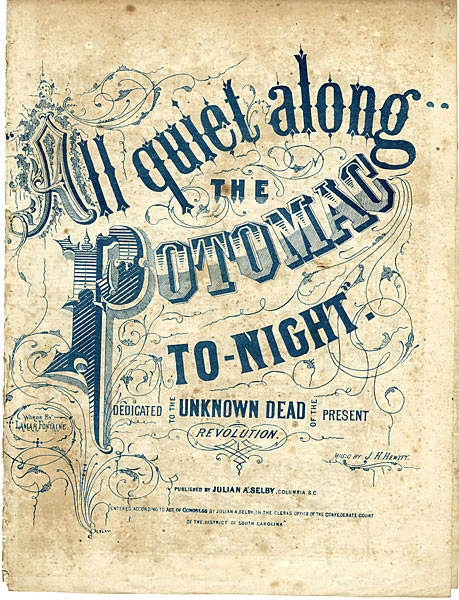All Quiet Along The Potomac
| "All quiet along the Potomac," they say,
"Except now and then a stray picket Is shot, as he walks on his beat, to and fro, By a rifleman hid in the thicket. 'T is nothing—a private or two, now and then, Will not count in the news of the battle; Not an officer lost—only one of the men, Moaning out, all alone, the death rattle." All quiet along the Potomac to-night, Where the soldiers lie peacefully dreaming; Their tents in the rays of the clear autumn moon, Or the light of the watch-fires, are gleaming. A tremulous sigh, as the gentle night wind Through the forest leaves softly is creeping; While stars up above, with their glittering eyes, Keep guard—for the army is sleeping. "And thinks of the two on the low trundle-bed." There's only the sound of the lone sentry's tread As he tramps from the rock to the fountain, And he thinks of the two in the low trundle-bed, Far away in the cot on the mountain. His musket falls slack; his face, dark and grim, Grows gentle with memories tender, As he mutters a prayer for the children asleep, For their mother,—may Heaven defend her! The moon seems to shine just as brightly as then, That night when the love yet unspoken Leaped up to his lips—when low, murmured vows Were pledged to be ever unbroken; Then drawing his sleeve roughly over his eyes, He dashes off tears that are welling, And gathers his gun closer up to its place, As if to keep down the heart-swelling He passes the fountain, the blasted pine tree,— The footstep is lagging and weary; Yet onward he goes, through the broad belt of light, Toward the shade of the forest so dreary. The Picket is Off Duty Forever Hark! was it the night wind that rustled the leaves? Was it moonlight so wondrously flashing? It looked like a rifle—"Ha! Mary, good-by!" And the life-blood is ebbing and plashing. All quiet along the Potomac to-night,— No sound save the rush of the river; While soft falls the dew on the face of the dead,— The picket's off duty forever. |
About This Music
Did You Know?- In the fall of 1861, many of the war dispatches lulled the public into a sense of false security with the heading "All quiet along the Potomac." Despite such headlines, men doing lone sentry duty at night were fired on by snipers and often killed. In November 1861, Ethel Beers, from Massachusetts, wrote a poem entitled All Quiet Along the Potomac Tonight and sent it to Harper's Weekly magazine, where it was published. Considered one of the finest and most sensitive wartime poems, its authorship was claimed, erroneously, by several southerners. Marylander John Hill Hewitt set the poem to music, and the popular and tender song was adopted by both sets of forces.
